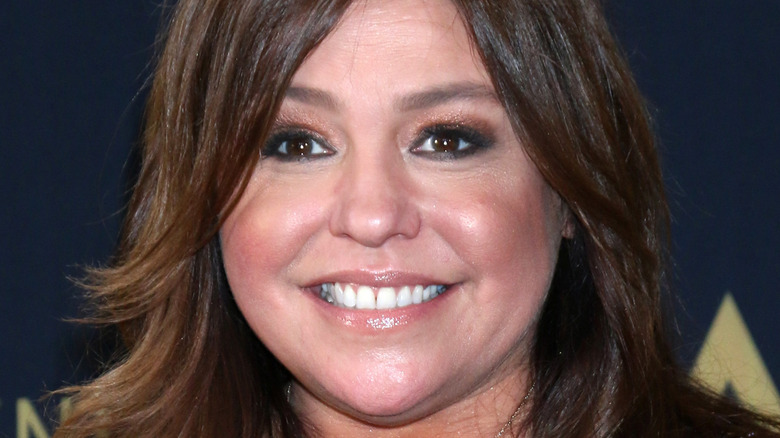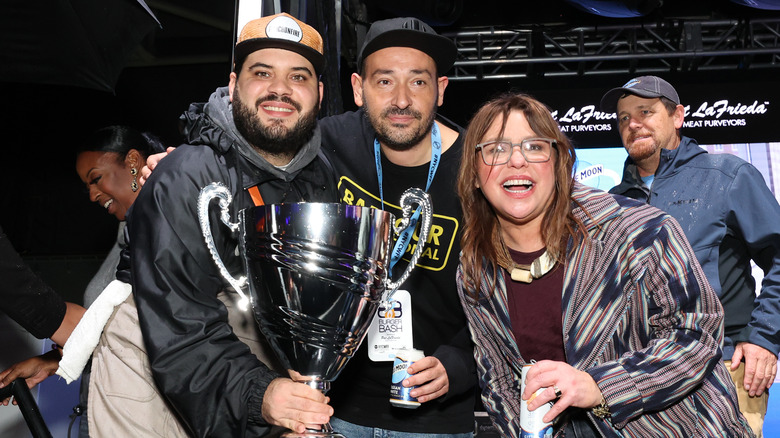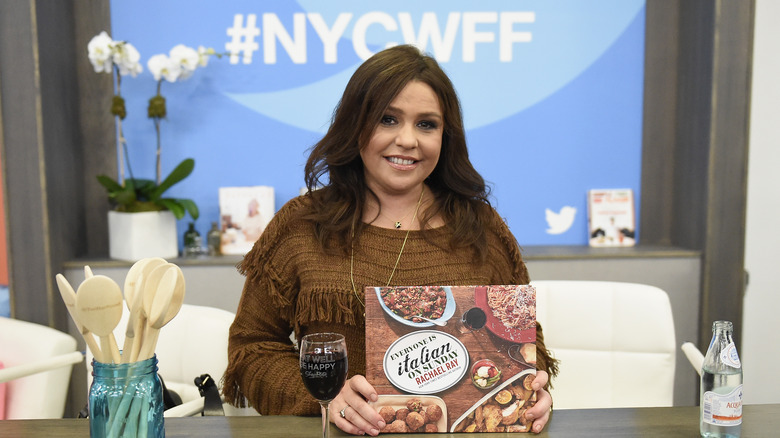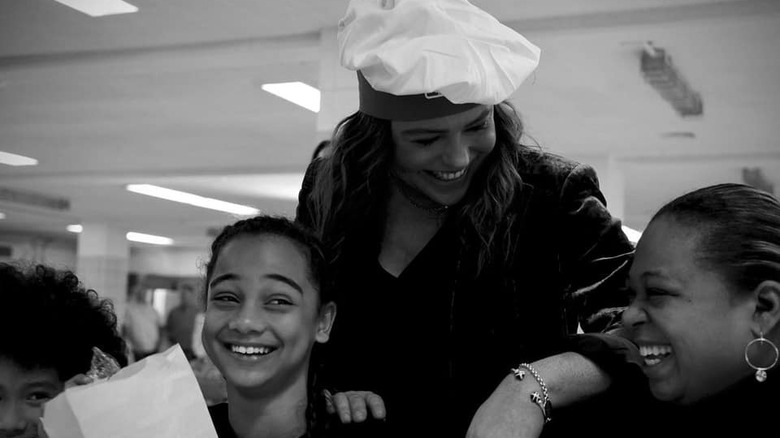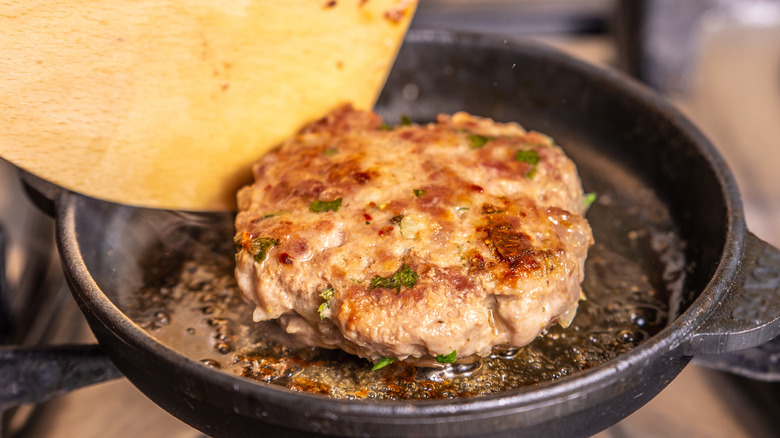Rachael Ray Looks Back On Her Career In Food - Exclusive Interview
The annual Food Network New York City Wine & Food Festival is a culinary institution in its own right. Fifteen years along, the event is well-known and loved by not just New Yorkers but also chefs, restaurateurs, and foodies from just about everywhere. And it's almost impossible to think about this iconic Food Network event without the name Rachael Ray coming to mind. The home cook behind "30 Minute Meals" is one of the most famous TV chefs out there, she largely helped launch Food Network into the household brand it is today, and she's been hosting the NYCWFF since it first began.
Tasting Table got the chance to chat with Ray at the most recent NYCWFF, where she looked back on her career and how she got to where she is today. She also shared details about her more recent philanthropic efforts to provide school children with vegan lunches. And while hosting the event's annual Burger Bash, she shared some of her tips for making easy and delicious burgers at home.
Rachael Ray reflects on the evolution of her career
You host at the Food Network NYCWFF every year. What does this event mean to you?
The idea that it happened to begin with [means a lot]. When I started this, it was when I first started on Food Network, and there was literally a website called I Hate Rachael Ray. There were a lot of people that were colleagues or chefs that thought, "What is a person who's not Culinary Institute trained doing around us?"
I started working in kitchens when I was 8 or 9. I got my working papers when I was 14. My first memory actually was when I was 3 and I grilled my thumb to the flattop in our restaurant in Cape Cod. I have a "Harry Potter" scar on my thumb. That marked me to work in food. I've always been a person that felt that people of service should be just that, people of service. I didn't really care if I was popular or if I was the best in class or if anybody wanted me there or not. I just cared about whether or not I gave good service.
I got my job in this world by accident. We couldn't sell enough groceries at the store I was working at, where I was both the buyer and cooking in the kitchen. I thought, "How can I help our business?" My boss said, "Why don't you teach your food? Everybody loves your food. Let's do some cooking classes for fun [and] make a little extra money around the holidays." That person was Donna Carnavale, and she's still my friend to this day. She was just with us for our anniversary in Italy.
I geeked out and thought, "What if I could teach people six base recipes and five things they could do with each thing? Then, they could make a month of food without ever repeating themselves." I did a three-hour class, where I taught one of each of the six things, three hours. Everybody had a little station, and we got football players, girls getting married, young people, old people, people of every age and ilk. I thought, "Maybe we should try and do something more with this."
The local news came and did a story on it. Then, I asked the news station if they would let us do it every week, if I could wear a cap from our market so people would know I was from Cowan & Lobel, and could we teach in real places? Would they give me a [cameraman] to go to firehouses, classrooms, [and] people's homes? That was [the origin of] "30 Minute Meals."
What Rachael Ray is most proud of in her career since 30 Minute Meals
Then, one of my friends from public radio in Albany called and said that his guest canceled for Vox Pop. He said, "Rach, come on over and cook on a hot plate." I said, "That's illegal, but okay." I left work and made Jambalika, which is a 30-minute knockoff of jambalaya. We did it on the radio, and Luke Ekas [from the Culinary Institute in Hyde Park] heard it and told his friend, "Check out this girl. I don't know what she looks like. I don't know what she does. She's funny and she's cooking on public radio." His friend was Bob Trishman. He was the senior vice president of the Food Network. ... That's how I got "30 Minute Meals."
There's not a person [who's been] in my life that's not still in my life, [including] all of my former bosses. Every person all along that way, from Joe Musco to Donna Carnavale — all the people in my life are still in my life. My dear mentor, Brooke Johnson, from the Food Network, Judy Gerard before her, Oprah — all of the people that have been a part of [my career] are still such a huge part of [my life]. We've never broken ties.
If I look back at my life, I'm proud of two things. I created a foundation to support philanthropy to give back to the world because I don't have human children. I have dogs, but I wanted to give back to humans first. We started our initiatives [by] benefiting school food, feeding the hungry, and improving year-round food security for the young people in America. We expanded from there. I have rescue animals, [and] we've given away over $80 million.
I never thought I'd earn that in my entire lifetime, and all of that's generated by product[s] that people need. There's nothing I put my name on [without saying], "I'm really proud of that." It does so much good because it generates love and awareness on so many levels. Now I work often in Ukraine. I'm going back in a few days. I love my life. I earned my life.
We have to be thoughtful about our lives. When you build a life for yourself, not only do you have to find a niche for yourself or your business or money, you need to find a way to give back. I think the universe only keeps you in balance as long as you are balanced and decide to give as much as you get. I truly believe this.
Rachael Ray on vegan food and improving school lunches
On that note, you're working with the New York City Chef's Council on vegan lunches for children.
I've been doing this for 20 years. I've been working for school food improvements for decades because it's the only fair playground to lower the health care cost of the future, to better the health of young people, to introduce them to decent food ... or, for at-risk kids that might go hungry, to instead give them access to food. The only way we can do all of those things at the same time is through the public food system.
For the richest, smartest country in the world that is so huge in agriculture, you can't feed your own children and keep them getting good grades, or able to stay awake in class, or able to not go to bed hungry, or able to eat better food than a drive-thru? Give me a break. Knock it off, and give some money to the right programs and feed kids 12 months a year. Get rid of food insecurity. If [kids can] get one good meal a day, they're going to be [more] solid. They will show up at school. They'll be able to think. They won't go to bed completely starving. It lowers your health care costs.
The trickle-down effect, basically.
Exactly. I've been doing this for over 20 years. Here in New York, we're working for wellness in schools, and our foundation funded the project to get it going. We're finally bringing together the superheroes, like all that stuff you see in actual superhero movies, but these are food superheroes.
J.J. Johnson was just on today. I love him. He has these rice bowl shops, FIELDTRIP, that teach New Yorkers [about rice dishes around the world and] how to eat all these different cultures and flavors and open their lives up and their stomachs up to fun stuff with something that's trending — quinoa and rice with a bunch of cool toppings. He's one of our chefs on the Chef's Council that's helping us.
All these folks are coming together and helping us create, with Mayor Adams' office, a program where the food is going to be made by humans from scratch, and it's plant-based and it's tasty. These are mind-blowers for a lot of people.
Do you eat a lot of vegan food?
I eat a fair amount. John and I are flexitarians. We eat everything, but we eat more plant-based than people would imagine. John's favorite four-letter word remains "pork." But we always love Burger Bash because we free-formed the meaning of that from the get-go. You can make a burger out of shrimp. You can make a plant-based burger.
This is how Rachael Ray likes a good burger
You've said before, burgers are one of your favorite foods. If you're making the best, ultimate burger, what are you putting on it?
It's not about the burger itself. It's about the balance. You should never sog out the bun. You should make sure the protein of choice, even if it's plant-based, gets crispy on both sides. Make the patties even in size and shape. Cook them all at the same time on a flat, hot surface.
I cook on cast iron. Even if I'm outside, I put a slab on the grill because everywhere the protein — or anything that has natural sugars in it — touches, that's what creates that crust and that reddish-brown, yummy bite. Your burger-to-bun ratio is very important. I'm a big believer in a little sauce on both sides and two different sauces.
Do you do mayo and mustard?
I don't do mayo at all. When I make special sauce, I use sour cream or Greek yogurt. It's thicker and tangier. Then [I add] ketchup, Worcestershire, relish, salt, [and] pepper.
I make a lot of versions of that, some with more horseradish, some ranch style, all kinds of things. There are some burgers and patty melts that I'll put mustard on one side and special sauce on the other. I rarely use mayonnaise, and when I do, it's usually vegan because people eat burgers in [the] hot months of the year. I don't want to be eating two-hour-old, baked-in-the-sun raw egg.
For the latest from Rachael Ray, follow her on Instagram. Plus, learn more about the annual Food Network New York City Wine & Food Festival, presented by Capital One, and be sure to check out the highlights from this year's event.
This interview has been edited for clarity.
